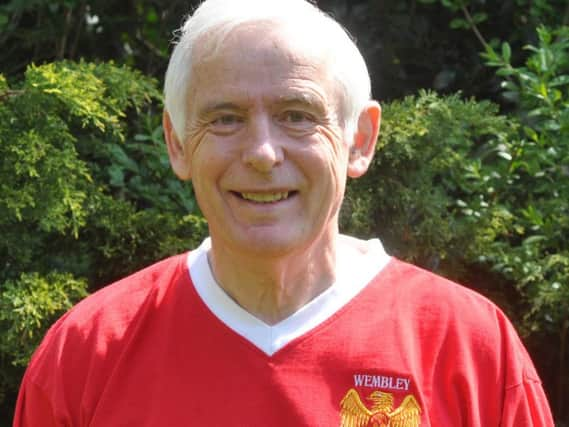Lifelong emotional link with the tragic Munich air crash


A chance childhood encounter in countryside near my Burgess Hill home led me to a lifelong emotional link with the tragic Munich air crash that happened 60 years ago on February 6.
Manchester United fans all over the world commemorate the sad anniversary of the afternoon in 1958 when eight top players perished after United’s plane home from Belgrade failed to lift off after re-fuelling at snow-bound Munich airport. I divide my loyalties between United and Brighton and Hove Albion because my grandfather played a couple of games for Albion many moons ago and I followed them as a youngster.
Advertisement
Hide AdAdvertisement
Hide AdBut my first childhood link was with United and after Munich it continued in the 1960s at the old Goldstone Ground when the talented Alex Dawson and Nobby Lawton, once hailed as new Busby Babes after the crash, appeared successfully in Albion colours.
The younger Dawson and Lawton were nowhere near United’s star-studded first team when I first saw the all-conquering pre-Munich team on briefly on Pathe News and an uncle’s television in Burgess Hill. Disaster was yet to enter my young life, just thrilling football.
One commanding figure seemed to loom much larger than life out of the small “snowy” screen. What seemed like a huge man with thighs like tree trunks was thundering towards the opponent’s goal.
But he was a class above the many burly brutes who kicked their way to payday in the 1950s; his control of the ball was immaculate. Imagine a powerful bull dancing with finesse. He was, in the utter conviction of United manager Matt Busby, ready to be the greatest player the world had ever seen. Indeed some pundits and fans still insist he already was. He was Duncan Edwards and he was more man than boy at only 21.
Advertisement
Hide AdAdvertisement
Hide AdAs a kid of six I was astonished to see the burly and muscular Edwards stop on the spot despite his massive strength and drill an inch perfect pass to the wing. Or he would draw back a leg and hammer the ball past the goalkeeper from 20 yards. Then I would catch him heading a goal like a centre forward with the heavy balls they used to use, or heading powerfully clear from defence. No wonder the hard-to-please Busby called him the most perfect footballer he ever saw, George Best and Pele included.
I do not have space here to recall all the magic I saw from that white-shirted team in brief clips at the age of seven. But a dashing, dynamic kid of 21 called Eddie Colman was, I later realised, the perfect foil to Edwards in midfield. Swivelling hips, quick brain, passing like laser and a tough tackle. Imagine Paul Scholes and Roy Keane rolled into one. There were plenty of others, all destined for greatness.
Then one day all my dreams were shattered on a country walk. For innocent amusement myself and my twin John looked into an empty cottage as we walked across fields very near our home in Burgess Hill.
And scattered on the floor were newspapers. The images I saw on them shattered me. “Edwards Dead.” said one, recording Duncan’s astonishing and heart-breaking 15-day fight for life after suffering terrible injuries in the crash.
Advertisement
Hide AdAdvertisement
Hide AdI had known nothing of the disaster. Then a spread of pictures tore the heart out of me. There staring at me were the eight hugely talented players that died. Edwards, his inspirational skipper Roger Byrne, 28, Geoff Bent, 25, England goal ace Tommy Taylor, 26. Liam Whelan, 22, Eddie Colman, 21, David Pegg, 22 and Mark Jones, 24. Non-players died with them, the crash costing 23 lives.
I had known nothing of the disaster. As a mere child, no-one had thought to tell me about the news coverage, which had been a few months before.I later learned other players survived the wreckage as the plane failed to take off but some never played again or were not as good. Except Harry Gregg, Bobby Charlton and Bill Foulkes, who helped rebuild United as they won the European Cup against Benfica in 1968. I was there at Wembley, yet when the whistle went all I could think of, albeit briefly, was this was where Edwards and pals should be. Busby thought the same. Foulkes and Charlton, embracing Busby , must have spared more than a thought for them too.
United have moved on in six decades to more glory, great teams and some failures.But this 60th commemoration of Munich will make me again cast my mind back to my childhood encounter with disaster and will pose the question that still haunts me to this day. What if?